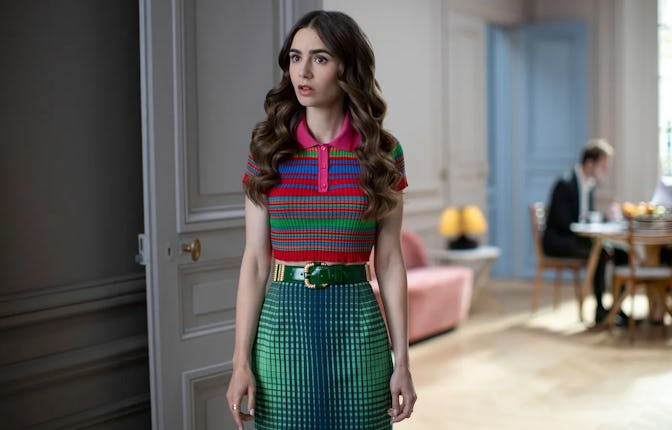We love to hate 'Emily In Paris' because we love to hate ourselves
The highly watched but loathed show perfectly encapsulates what's wrong with Americans.

It’s an iconic cliché: the blissfully ignorant American in Paris. Of all of the European countries that Americans flock to, France is the one that perhaps most famously does not like receiving us. The French have very little tolerance for our propensity to ignore cultural norms that aren’t our own. And yet we will continue to put places like Paris and the french coast on our Pinterest boards titled “wanderlust❤️.” It’s part of the French je ne sais quoi that we just can’t get enough of — because what’s more intoxicating than lusting after something or someone that doesn’t want you back?
But that’s where Emily In Paris comes in. She’s the antithesis of the tacky tourist that Parisians love to hate. She’s chic! She’s smart! She’s driven! Or at least that’s what the marketing for the show would have you believe: that Emily in Paris is supposed to be an acid trip epilogue to the last two episodes of Sex And The City, where Carrie’s millennial niece takes up the torch to travel to Paris and prove why Americans are just misunderstood and the French are rude.
But outside of having been created by SATC creator Darren Star, Emily (Lily Collins) has no affiliation to Carrie. And despite Emily’s couture packaging and doe-eyed glamour, she contains multitudes...of irritating American qualities. She encapsulates the noxious facets of American culture that we’re all beholden to, but also feel existentially trapped by, like the mentality to be constantly working and the tendency to celebrate consumer capitalism. She overly involves herself in other people’s business, and is consistently being told to back off, but responds by grinding in her $2,000 heels — because basics love nothing more than to see people’s honest rebuffs of them as a challenge to win them over. It’s essentially a genre of entertainment at this point.
Emily is also prudish, saccharinely sentimental, self-involved, and unironically obsessed with social media. And perhaps that’s why we love to hate watch Emily In Paris. There is a catharsis in seeing Emily get constantly brow beaten for her gross Americanisms. There’s relief in realizing that our culture isn’t just vanilla; it’s a symbiotic force that has engrained patterns and mannerisms into us that we often don’t even realize we have. Watching Emily be rebuked just for essentially being a product of millennial America is (sadly) like an emotional hall pass.
While Season 1 saw Emily get harshly ridiculed and mocked consistently — allowing us at home to sanctimoniously yell, “Ew, Emily!” at the TV, while scarfing down processed food snacks and shoving the fear that we might be just like her into the back of our minds — Season 2 features Emily having found her footing a bit more. It’s a completion of the simulation. First they got us to hate Emily for being toxically American, and then they got us to root for her, because at her core, and ours, we all want to be forgiven for the crappy things American culture has breathed into our personalities.
Lines like “They value your Americanness,” in reference to one of Emily’s marketing accounts, while delivered with a bit of French contempt, shifts the narrative this season from last. Even when Emily annoyingly whines, “I’ve never been held back from anything,” as she gets put in a lower level of french language classes, the sentiment is meant to be delivered with the zeal of the American work ethic, as opposed to Emily’s deeply engrained white privilege — the gag is that it’s both.
There’s the same tonal confusion in the way Emily doesn’t bat an eye when she self-righteously foot stomps, “I’m not someone who can transform into a girl who sleeps with her friend’s boyfriend and not care.” She did indeed sleep with her only French friend’s boyfriend — but she cares, so forgiveness should be on the table. It’s the Karen-ness of it all, delivered with earnest conviction, that really takes the contemptibility of Emily from last season to a new level. She might be more self aware, but she hasn’t really changed — but isn’t that a part of everyone’s self-involved 21st century journey to wholeness?
But lest we forget, this is a Darren Star production. His first heroine, Carrie Bradshaw — the same character Emily feels as if she’s distantly related to in the basic white female multiverse — was someone who, at the time the show was aired, was revered and copied by American women coast to coast. But she didn’t stand the test of time. She’s still a pop culture fixture years later, but she’s been realized to share some of the same characteristics as Emily: self-absorbed, superficial, and privileged. Perhaps Emily is Star’s attempt at redemption: by giving us someone a bit more obviously detestable, so we can grapple with our frustrations with white womanhood in real time, as opposed to decades later in retrospect. Because if white women love to do anything, it’s be self loathing, while shoving it down with bio hacks and Instagram shamanism. As Emily says herself, “America is more about health and wellness now,” and maybe part of our health and wellness is having a namasté moment in recognizing Emily’s light in ourselves.